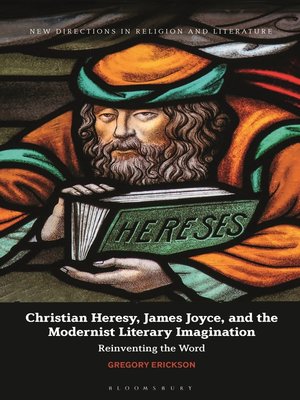Christian Heresy, James Joyce, and the Modernist Literary Imagination
ebook ∣ New Directions in Religion and Literature
By Gregory Erickson

Sign up to save your library
With an OverDrive account, you can save your favorite libraries for at-a-glance information about availability. Find out more about OverDrive accounts.
Find this title in Libby, the library reading app by OverDrive.



Search for a digital library with this title
Title found at these libraries:
| Library Name | Distance |
|---|---|
| Loading... |
Shortlisted for the AAR Book Award for Excellence in the Study of Religion 2023
Organized by heretical movements and texts from the Gnostic Gospels to The Book of Mormon, this book uses the work of James Joyce – particularly Ulysses and Finnegan's Wake – as a prism to explore how the history of Christian heresy remains part of how we read, write, and think about books today.
Erickson argues that the study of classical, medieval, and modern debates over heresy and orthodoxy provide new ways of understanding modernist literature and literary theory. Using Joyce's works as a springboard to explore different perspectives and intersections of 20th century literature and the modern literary and religious imagination, this book gives us new insights into how our modern and "secular" reading practices unintentionally reflect how we understand our religious histories.
Organized by heretical movements and texts from the Gnostic Gospels to The Book of Mormon, this book uses the work of James Joyce – particularly Ulysses and Finnegan's Wake – as a prism to explore how the history of Christian heresy remains part of how we read, write, and think about books today.
Erickson argues that the study of classical, medieval, and modern debates over heresy and orthodoxy provide new ways of understanding modernist literature and literary theory. Using Joyce's works as a springboard to explore different perspectives and intersections of 20th century literature and the modern literary and religious imagination, this book gives us new insights into how our modern and "secular" reading practices unintentionally reflect how we understand our religious histories.







